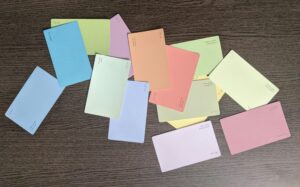Flashcards are a simple but highly effective revision tool that can help students retain information and improve their exam performance. Research shows that active recall—where students actively test themselves rather than just re-reading notes—is one of the best ways to strengthen memory. Flashcards encourage this process by prompting students to retrieve key facts, definitions, and concepts repeatedly.
Why Are Flashcards Useful for Revision?
Flashcards work because they engage students in active learning. Instead of passively reading or highlighting notes, they challenge the brain to recall information, strengthening memory connections. They also encourage spaced repetition (a technique that we looked in our last monthly newsletter) where students review information at increasing intervals, which helps to move knowledge from short-term to long-term memory.
How to Write a Good Flashcard
To be effective, flashcards should be:
- Concise – Include only key information. A question, definition, or key term on one side and the answer on the other.
- Clear – Use simple language and avoid overloading cards with too much detail.
- Engaging – Colour-coding, images, and diagrams can make flashcards more visually stimulating and easier to remember.
- Focused – Each card should cover one idea or concept to avoid confusion.
How to Use Flashcards Effectively
Try to:
- Say the answer out loud before flipping the card over to check. Alternatively, they can write the answer down.
- Sort cards into “known” and “not yet known” piles—this allows them to focus on weaker areas.
- Use them in short, focused sessions rather than cramming. A few minutes each day is more effective than hours in one go.
- Shuffle the order regularly to avoid simply memorising the sequence.
The Benefits of Digital Flashcards
While traditional paper flashcards work well, digital versions offer additional advantages:
- Apps like Anki, Quizlet, and Brainscape use algorithms to track progress and adjust revision sessions.
- They can be accessed anywhere—on a phone, tablet, or computer— making revision more flexible.
- Many include pre-made decks for common subjects, saving time on writing them from scratch.





